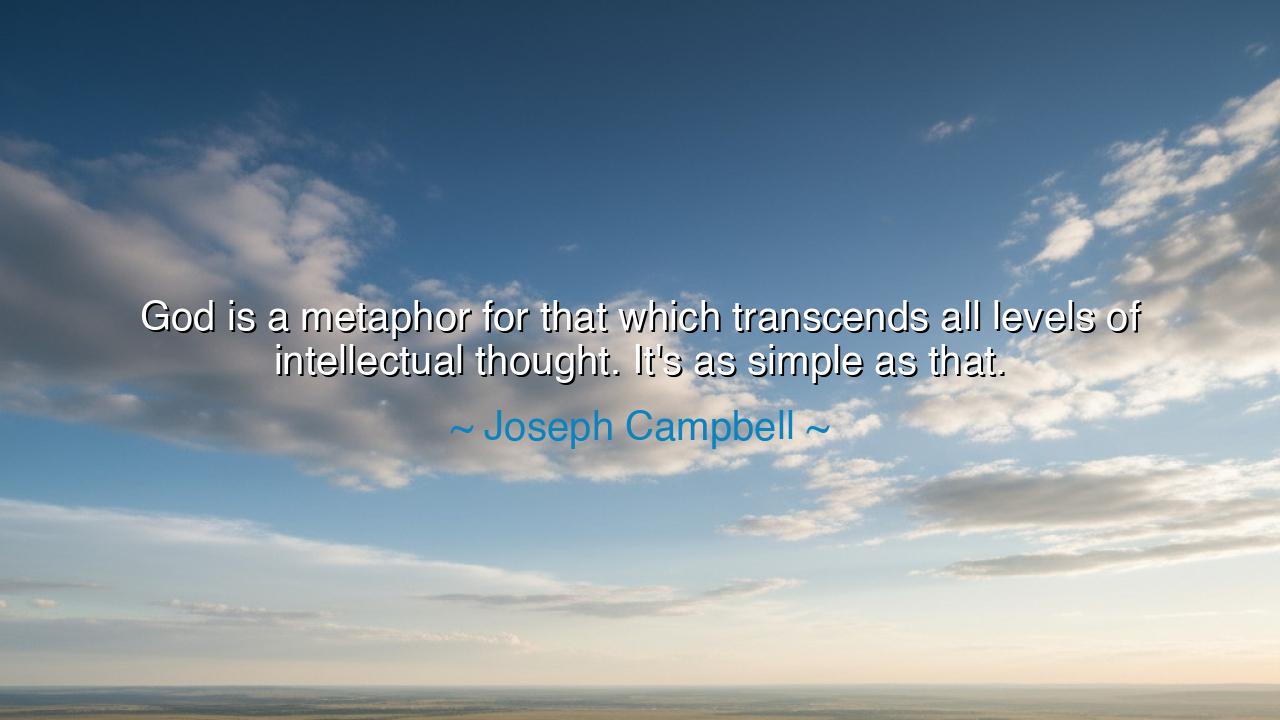
God is a metaphor for that which transcends all levels of
God is a metaphor for that which transcends all levels of intellectual thought. It's as simple as that.






“God is a metaphor for that which transcends all levels of intellectual thought. It’s as simple as that.” — Thus spoke Joseph Campbell, the great sage of myth and meaning, whose words bridged the ancient and the modern, the sacred and the human. In this saying, Campbell draws back the veil of theology and philosophy to reveal a truth that burns at the heart of all religion: that God is not a concept to be measured or confined by reason, but the symbol of that which lies beyond reason — the infinite, the mystery, the source from which all life and consciousness arise. It is a truth both humbling and liberating: that no thought can contain the Divine, yet all thought may reach toward it.
To understand Campbell’s words, one must first understand the spirit of the metaphor. For a metaphor is not a lie — it is a bridge, a way of expressing what cannot be directly spoken. When Campbell calls God a metaphor, he does not diminish the sacred; he exalts it. He reminds us that all our names for the Divine — “God,” “Spirit,” “Truth,” “The One,” “The Eternal” — are but fingers pointing toward the sun, not the sun itself. The metaphor is the vessel; the mystery is the water it holds. The mind, with its logic and categories, can build the cup, but the infinite forever overflows its edges.
Campbell, who spent his life studying the myths of every culture, saw a single thread running through them all — a golden thread of transcendence. From the hymns of the Vedas to the psalms of David, from the Tao of Laozi to the parables of Christ, each tradition sought to express the inexpressible. Yet the forms differed, for each people spoke in the language of their own experience. “God” was a metaphor for the same eternal mystery that the Buddha called Nirvana and the Greeks called The Logos. Thus, Campbell taught that the sacred is universal, and that the names we give it are but shadows of the same radiant light.
He illustrated this truth through the stories of mythic heroes — Odysseus, Gautama, Moses, Arjuna, Christ — each one journeying from the known world into the realm of the unknown, where reason falters and only faith, courage, and awe remain. In that realm, the hero meets not the “God” of dogma, but the divine mystery itself — that which “transcends all levels of intellectual thought.” When Moses stood before the burning bush and heard the words, “I AM THAT I AM,” he received not a doctrine but a revelation of existence beyond all comprehension. God, in that moment, was not a being among beings, but Being itself.
And yet, mankind, fearful of mystery, often mistakes the metaphor for the truth it represents. Wars have been fought, nations divided, and hearts hardened over the names of the nameless. Campbell warned that when we worship the symbol instead of the source, we imprison the infinite within our own understanding. The metaphor becomes an idol; the living God becomes a relic of words. True reverence, he said, is not in clinging to belief, but in opening oneself to wonder, in standing humbly before the great unknown and saying, “I do not understand — but I am in awe.”
In his own life, Campbell sought that wonder not in temples, but in the world itself. He found God in the sunrise, in the cry of the hawk, in the rhythm of a child’s laughter, in the stories that connect us all. To him, myth and religion were mirrors, reflecting humanity’s longing for the infinite. The scholar who studies the myth may see patterns; the mystic who lives it feels truth. Both are paths that lead toward the same transcendent horizon, where language ends and silence begins — the silence where God dwells.
Thus, the meaning of Campbell’s words is this: God is not a thought to be proven, but a mystery to be experienced. The mind seeks definition; the heart seeks connection. Thought may lead us to the threshold, but only love and wonder can cross it. To live wisely, then, is to remember that all understanding is partial, and that our faith, whatever its form, must remain alive — ever growing, ever open to the endless depth of the divine.
So, my children, take this lesson: do not argue about the name of the Infinite — seek to feel it. Look upon the stars as your ancestors once did, and sense the vastness that gave you life. Listen to music, to the wind, to silence itself, and let it speak of the mystery beyond thought. Let your intellect serve your spirit, not bind it. For the truest knowledge of God is not found in definitions or debates, but in awe, in reverence, and in the quiet surrender of the heart that whispers, “I am part of the mystery, and the mystery is part of me.”






AAdministratorAdministrator
Welcome, honored guests. Please leave a comment, we will respond soon